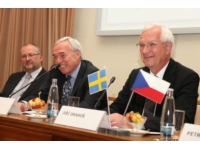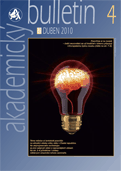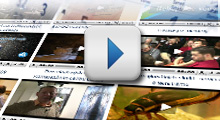
The members of the Swedish Royal Technology Mission 2012, which was not lacking even King Carl XVI Gustaf, met on Wednesday 9 May 2012 at the headquarters of the ASCR with the representatives of out most important scientific institution. At the opening, President of the ASCR Prof. Jiří Drahoš welcomed the guests. He briefly introduced the Academy of Sciences of the CR and its role in our system of science and research, including the international cooperation projects. The Swedish delegation then was acquainted with the Tokamak COMPASS project by Director of the Institute of Plasma Physics Petr Křenek and Head of the Tokamak Department Radomír Pánek. The PALS system was presented by the project coordinator Jiří Ullschmied and Director of the Institute of Physics of the ASCR Jan Řídký introduced the future superlaser called ELI.
The day before, the Swedish guests were welcomed at the Institute of Botany (BÚ) of the
Academy of Sciences of the CR in Průhonice. The functioning of the workplaces there was introduced
by Director of the BÚ of the ASCR Jan Kirschner. The President of the Learned Society of the CR
Prof. Václav Pačes then spoke on one of the largest projects financed by the European Union – the
biotechnological and biomedical centre BIOCEV. King Carl Gustaf of Sweden also inspected with great
interest the complex of Průhonice Park.
The reason for the visit of the Royal Technology Mission is to acquire more detailed
information of the strategies, initiatives and opportunities in those countries of the EU that have
industrial, technological and scientific traditions similar to Sweden’s. Of the new members of the
EU, the CR is the second largest trading partner of this advanced Scandinavian country;
approximately 200 Swedish companies are represented here. In the CR, the Royal Technology Mission
discussed cooperation particularly in three key areas – in information technology, nanotechnology
and medicine.
Photo: Stanislava Kyselová, Akademický bulletin
Prepared by: Department of Media Communication of the Head Office of the ASCR
11 May 2012





